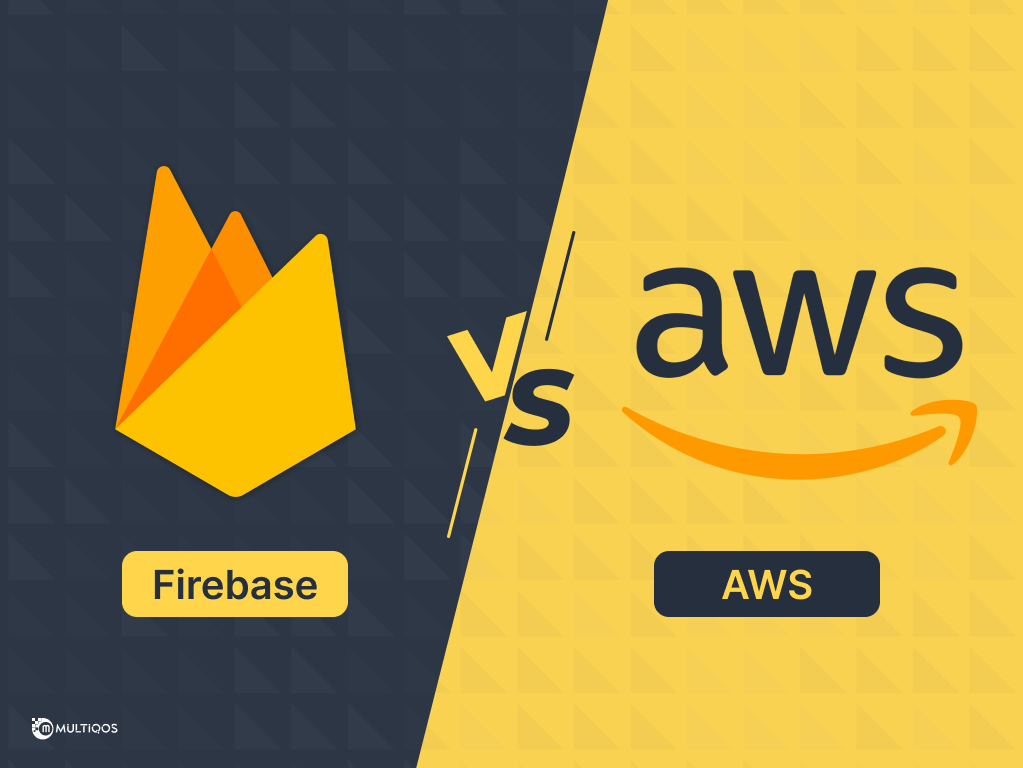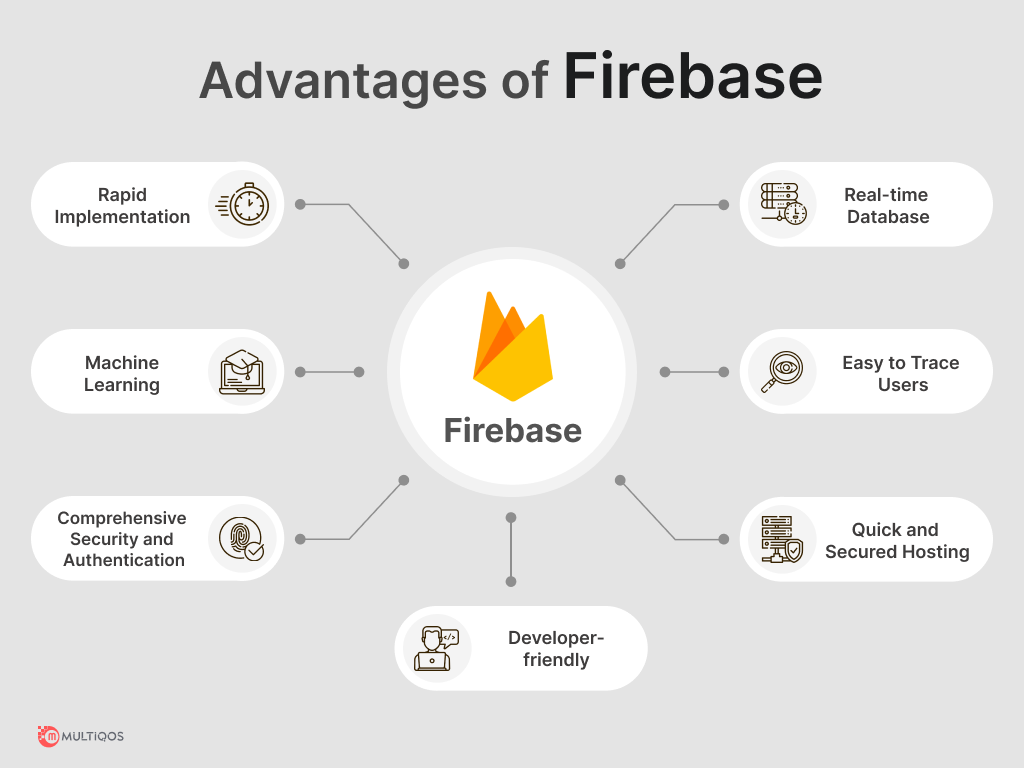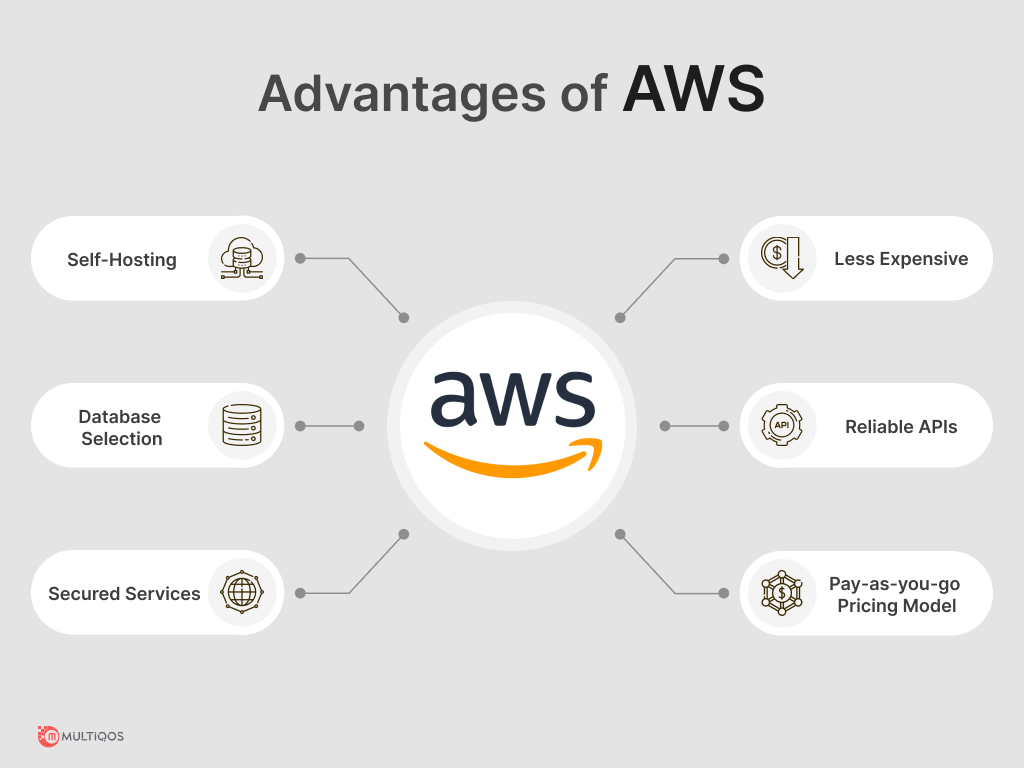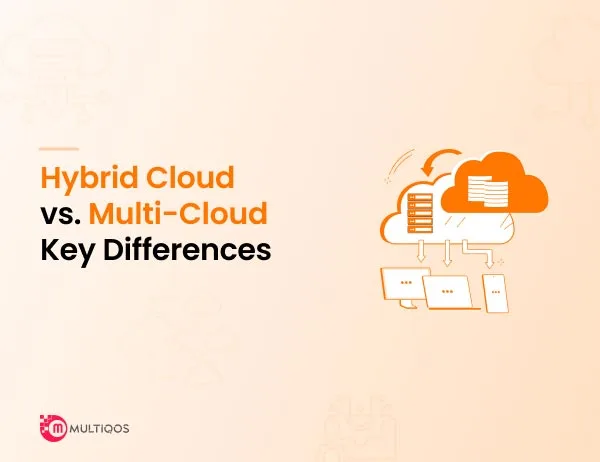Firebase vs. AWS: Which One Is Suitable for Your Next Project?

Overview
Cloud computing has indeed been playing a significant role in recent years since it enables programs to perform a wide variety of jobs. Web developer teams create incredible applications using their preferred tools and languages. As a result, developer expertise is critical in online and Web Development and mobile application development. When it comes to cloud computing, you now have a plethora of options. Apart from installing and scaling online and mobile applications, they may be used to monitor them.
In recent years, mobile and web development have advanced significantly. While more powerful capabilities are included in modern apps, running a web or mobile application requires more than simply a hosting provider. Numerous large corporations, such as Amazon and Google, provide all you might want in this industry. However, with the availability of serverless architectures, an increasing number of developers and businesses are opting for the serverless option. We’ll compare Firebase vs. AWS in this post and help your web development team pick the right choice for your app.
What is Serverless Architecture?
Previously, a single server was responsible for a range of code-based tasks. When you, the user, submit a request, the server processes it via numerous distinct processes and returns a response. Fundamentally, it is the means through which the user connects with the computer. A single server may perform a wide variety of distinct coding tasks. These features include file creation, user monitoring, authentication, and file transfer. With all of the operations that may be executed concurrently, it’s quite simple to overwhelm a single server, resulting in computer problems and data loss.
Serverless architecture is a microservice architecture, which means you may construct your Infrastructure using multiple cloud parts and then send it to managed servers, here in this instance, to the AWS or Google Firebase, which will execute the code anytime an occurrence triggers it. In other words, the phrase “serverless” refers to a method of executing cloud computing in which the cloud provider manages your applications. Additionally, this is referred to as Back-end as a Service (BaaS). On the other hand, if your applications are written in custom code, the term “Function as a Service” applies (FaaS). However, the ideas behind both are the same.
Serverless architecture is significant in and of itself. As said before, it is composed of microservices that deconstruct monolithic apps into smaller services. The code, in this case, “wakes up” only when a code or function is run. As a consequence, it will not operate 24 hours a day or seven days a week, resulting in less server overload and calculation mistakes.
AWS Lambda or Firebase cloud functions use resources only when they are required. The advantage of serverless computing is that each operation has its responsibilities, and neither of them flops, which keeps things clean.
Google Firebase and Amazon AWS Overview
Google Firebase
Firebase has grown from a Mobile-Backend-as-a-Service (MBaaS) platform to a wonderful backend mobile and web application development solution. These services and tools will save you from starting from scratch each time and allow you to develop high-quality mobile and web apps more quickly. Firebase is a collection of tools and SDKs that enables you to build, maintain, enhance, and grow applications across many mobile application development platforms – web, iOS, and Android. In addition, Google Firebase provides features such as file storage, analytics, identity authentication, real-time database, failure analytics, cloud storage, and push messaging. In general, these services are hosted in the cloud.
Firebase is a convenient cloud computing service paradigm that enables developers to link their apps to APIs and backend cloud storage used by backend applications. Surprisingly, Firebase was developed on top of Google’s Infrastructure. You can use Firebase to get an SDK for iOS, Android, and the web. It’s advantageous if you’re a front-end developer and want to construct an application quickly. Additionally, you may do this without having any backend expertise. You may also use a REST API to develop a bespoke API.
Advantages of Firebase
Below-mentioned is some of the advantages of Google Firebase that businesses and developers may utilize to accelerate, smooth, and simplify their operations.
Rapid Implementation
Google Firebase enables you to set up your authentication system with minimum code rapidly.
Machine Learning
Firebase provides machine learning features that enable you to install and train custom models.
Managed Servers
Eliminate the need to maintain servers: since Firebase is a managed service, the Infrastructure is handled by Firebase. Additionally, it will assess and monitor your app on a regular basis to guarantee that it runs smoothly. Due to the cloud-based nature of Google Firebase, you may execute your mobile backend code without additionally managing your servers.
Comprehensive Security and Authentication
Google Firebase provides comprehensive security for your systems; it is supported by Google Sign-in, Chrome Password Manager, and Smart Lock. Google’s Firebase authentication streamlines the sign-in process by giving a cross-platform, end-to-end identity solution.
Cloud Storage
Google Firebase offers cloud storage that supports strong uploads and downloads, can handle user-generated material and provides easy and straightforward access management.
Real-time Database
Firebase is a real-time NoSQL database hosted in the cloud that enables the storage and synchronization of data. This benefit enables developers to access app data from any device and build incredible collaborative capabilities. Additionally, it may aid developers in executing backend code that can react to database events.
Easy to Trace Users
Firebase makes it easy to track a user’s journey across several devices. Additionally, you may choose whether a device (desktop, web, mobile, or tablet) is used to access your app. Additionally, data export from Google Analytics to BigQuery has become more manageable for this phase. This may be advantageous for developers in terms of successfully engaging more consumers.
Quick and Secured Hosting
Firebase enables you to have simple and secure web hosting with lightning-fast content delivery. Additionally, Firebase hosting includes complimentary SSL certificates.
Developer-friendly
Developers like Firebase because it enables them to concentrate on developing front-end code for mobile apps rather than backend programming.
Customized Notifications
With cloud messaging, you may customize alerts by specifying how and when they are delivered, the sound they should play, and the message’s expiry date. Additionally, it enables you to monitor custom conversion events.
Crash Reports
Many programs nowadays experience crashes or bugs. They actually slow down navigation, resulting in decreased user traffic. As a result, the application’s traffic and rating may decrease over time. Firebase has a crash reporting tool that enables you to repair issues and failures upon their occurrence rapidly. As a result, users can utilize the app easily and at a fast rate of speed.
Disadvantages of Firebase
The downsides of the use of Firebase are:
Vendor Lock
The issue with vendor lock-in has nothing to do with Firebase as a platform. In most circumstances, that is the issue with adopting BaaS systems in general. However, as long as Firebase does not provide tools for transferring data to another platform, this might be considered a disadvantage.
Constraints on Real-Time Data Storage
Generally, we save our data in a real-time database. However, that is not a viable alternative. Its primary disadvantage is its restricted querying capabilities. It will not let you transmit more than one key query at a time. Because the whole database is composed of JSON files, the service does not provide a means of filtering your data. Finally, it has no resemblance to the SQL format.
Reduced iOS Support
Firebase is capable of differentiating between iOS and Android apps. It does not support iOS applications as well as Android applications. It offers excellent support, specialized services, and features for Android smartphones. It allows for testing on a wide variety of Android devices. On the other hand, it supports closed betas for iOS devices, including those with minimal user interfaces and test devices.
Not Available in Many Countries
Google’s Firebase is a subdomain. Google, along with other Google services, is prohibited and cannot be accessed in countries such as China since China has restricted the URIs with *.google.com and *.googleapis.com.
Inconvenient Data Storage
Typically, you’ll utilize the Realtime Database as your main storage, which is not always desirable. The basic problem is a deficiency in query capability. There is no way to query for more than one key at a time and no way to filter your data. The complete database is contained in a JSON file, which differs significantly from SQL’s storage structure. Additionally, the format precludes data modeling.
Reduced portability. While certain components of the Firebase toolset are open-source (for example, the SDKs), the majority of the ecosystem is proprietary, making it more difficult to migrate to another platform in the future.
Reduced Data Migration
With the increasing popularity of cloud computing services such as Firebase, developers must consider how data will be transferred across platforms. If users do not have simple access to or control over upgrading specific app components due to the backend being hosted elsewhere. In that case, issues may occur with no means to resolve them other than starting again, which many people do not like.
Firebase Cost
If you have a small staff, Firebase may be preferable to a complicated AWS deployment. Additionally, it has a more manageable learning curve than Amazon Web Services. However, Firebase makes it more difficult to query huge datasets. Additionally, their database lacks relational data, which may be difficult for certain small organizations.
Also Read: Firebase vs. MongoDB: The Best Databases for 2024?
AWS (Amazon Web Services)
Amazon Web Services (AWS) is the world’s largest cloud computing service provider. It has proven to be Amazon’s most profitable division. As a consequence, enterprises have made it their primary cloud service provider of choice. In 2004, Amazon released SQS, commonly referred to as Simple Queue Service, which became the first AWS service. They introduced S3, previously known as Simple Storage Service, in 2006, which quickly became their most popular cloud service. Additionally, they created Elastic Compute Cloud (EC2), which enables enterprises to construct full-featured cloud applications.
AWS offers cloud computing solutions that are significantly more versatile, scalable, reliable, and configurable than Amazon’s cloud platform, whereas Amazon offers a comprehensive and cost-effective cloud platform. In order to build this platform, we used a unique combination of platform as a service, software as a service, and infrastructure as a service offerings. AWS now offers a more extensive portfolio of worldwide cloud-based commercial offerings. Today, the services have expanded to include identity management, augmented and virtual reality, databases, the Internet of Things, customer service, storage, and robots.
Advantages of AWS
Consider the following advantages of AWS to understanding the situation better.
Self-Hosting
AWS will also provide more flexibility than Firebase. Additionally, you will have the freedom to install open-source items and switch to another service.
Continuous Deployment
Similar to other services such as Netlify, AWS offers a permanent solution for continuous deployment. Additionally, Google Cloud enables continuous deployment. It does, however, need a bit of extra setting.
Distinct Settings
AWS provides distinct settings for various tasks such as testing, production, and development. However, with Firebase, you must create many projects, which is a lengthy procedure.
Reliable APIs
AWS provides dependable APIs in various programming languages to assist you in optimizing your Infrastructure. Be it taking backups or deploying a new component, AWS APIs are likely to handle everything.
More Functionality
AWS offers a greater variety of features and services than any cloud service provider. AWS is built on developing and cutting-edge technologies that enable customers to access the most advanced features available inside other services.
Database Selection
With AWS, you can pick the database type for your back end. In comparison, Firebase exclusively supports NoSQL databases.
All-in-One Solution
AWS provides apps with pre-packaged services. As a result, you can rely on AWS to provide an end-to-end solution for your needs.
Secured Services
AWS was intended and built to provide the most versatile, secure, and dependable cloud computing environment possible. AWS’s core infrastructure was created to meet the security needs of even the most vulnerable enterprises globally. AWS is supported by comprehensive and sophisticated security capabilities that easily satisfy security requirements.
Less Expensive
In many cases, AWS will be less expensive than Firebase because it is not a managed service. Additionally, AWS offers long-term contracts that yield savings of up to 75% above ordinary prices.
Pay-As-You-Go Pricing Model
AWS provides highly scalable and versatile cloud computing services at an affordable price. With AWS, you only pay for the services that your organization requires. Most astoundingly, you can also easily grow these services as needed. Now, you can easily envision having endless storage for your archive and backup requirements, as well as creating new servers, downsizing or upgrading existing servers, and much more, as your needs dictate.
Disadvantages of AWS
The downsides of the use of AWS are:
Cloud Computing Glitches
When moving to the cloud, AWS does have certain common cloud computing difficulties, such as unavailability, limited control, and backup protection. These shortcomings, however, may be remedied with time. As a result, they become a transitory concern.
Professional Shortage
Numerous firms have integrated AWS into their business processes since its inception as a cloud computing platform. However, there are just a few qualified AWS professionals on the market. As a result, many firms struggle to identify the best candidates for AWS installation. This might be considered a disadvantage of AWS.
Amazon’s EC2 Capacity Limits
AWS’s second constraint is that resources are limited by geographic location. Consequently, your location or area may dictate the number of resources available to you. With AWS, you cannot use an excessive amount of resources. This security measure prohibits malicious individuals from using the company’s resources to conduct hacking assaults. However, if more resources are required, you may always request them. Thus, if your aims are clear and unambiguous, this should not be a problem.
Confusing Bills
One of the most inconvenient elements of dealing with AWS is convoluted invoicing. Without technical experience or understanding, non-technical individuals may struggle to interpret the billings produced by AWS. This is when partnering with an AWS cloud support provider comes in handy. You may delegate the hard lifting to them and save the headache.
Data Utilization
Not all laws pertaining to data are created equal. Amazon Web Services may provide foreign corporations and government entities with access to and use your data without your knowledge.
Complex System
A Difficult System With such diverse tools developed over 15 years, AWS is less accessible than a younger, more streamlined choice.
AWS Cost
AWS operates on a pay-per-use basis. This implies that you are only charged for the sort of traffic you get. However, their whole atmosphere is inclusive. AWS is an excellent solution if you’re not interested in juggling several services. AWS has a very short learning curve, particularly given the breadth of its product offerings. Their Infrastructure is similarly geared at bigger teams, although that does not exclude smaller businesses without a dedicated DevOps specialist from using it. Regardless of the size of your workforce, though, AWS may wind up costing you more than you anticipated.
Firebase vs. AWS: The Final Comparison
In the final comparison between Firebase vs. amplify, Google’s Firebase is a Back-end as a Service (BaaS). Hosting, managed services, and an application development platform are all provided by this service. While AWS is a provider of Infrastructure as a Service, it’s not the only option (IaaS). It is the world’s most known cloud service company. It provides access to servers, storage, and virtual machines at a lower cost than Firebase. Here are a final comparison of the factors between amplify vs. Firebase.
Authentication
Both systems provide safe user authentication inside your application. You may integrate with established identity providers such as Facebook and Apple or create your user identification provider. The most significant difference between the systems is in the intricacies of their connections with federated identity providers, with Firebase being more straightforward to use and maintain. For implementation examples, see Firebase Auth and Amazon Cognito.
Storage
Rather than hosting user data on your servers, you may outsource this obligation to Google or Amazon’s object storage solutions. While Google’s Cloud Storage is a quick and powerful choice, Amazon’s S3 provides a more robust solution for massive uploads, object versioning, and metadata tagging.
Hosting
If you want elastic web application hosting, both services provide globally dispersed cloud networks optimized for React and Angular frameworks (among others). Both Google Firebase and AWS Amplify enable you to spend more time developing your app and less time on backend integrations by offering feature-rich toolkits that streamline the process of implementing critical but monotonous backend interfaces.
Notification
In AWS vs. Firebase, both platforms provide a rich set of notification capabilities for online and mobile apps. Once again, Google’s solution, Firebase Cloud Messaging, was created expressly for a Back-end as a Service use case. At the same time, AWS utilizes Pinpoint for marketing design and Simple Notification Service (SNS) to deliver messages to customers. This compartmentalization on AWS’s behalf benefits customers integrating with an existing AWS infrastructure environment but adds unnecessary complexity to a smaller project.
Price
Each platform has a free tier as well as a pay-as-you-go option. Many of Firebase’s services are entirely free. All analytics, communications, and prediction services, as well as other features, are absolutely free. And with the Blaze plan, you only pay for what is not included on the free tier. Firebase takes advantage of Google Cloud Pricing for computation and storage commodities. If you’re already clear on the requirements for your app (or will be), you may utilize their interactive cost calculator. It’s up to you to decide how many AWS services you’re using to pay for Amplify. While Amazon gives a handful of cost estimates on their Amplify price page, their generic AWS Pricing Calculator is likely to be more useful.
Backends for Traditional vs. Serverless Applications
Both Amplify and Firebase are “Backend as a Service” providers. They enable you to use their cloud infrastructure for purposes such as authentication and analytics. Many companies still operate within the conventional paradigm, which is in sharp contrast to this. Things are considerably easier using Firebase or Amplify. Few lines of code are required to incorporate Firebase Auth or AWS Cognito into your project. Additionally, this holds true for other messaging, storage, and analytics services. Additionally, you only pay for what you use, which simplifies growing.
Infrastructure vs. Back-end as a Service
AWS is a provider of Infrastructure as a Service. And AWS Amplify is one of Amazon’s several web infrastructure services. As a member of a large ecosystem, Amplify integrates seamlessly with the rest of your AWS infrastructure. This, however, results in a steeper learning curve for new customers attempting to develop using AWS Amplify. Firebase, on the other hand, has a more limited scope. While Firebase applications may be integrated with other Google Cloud Platform services, this is not the default use case for Firebase. This simplifies the learning curve associated with Firebase for novices.
Analytics
Both Firebase and Amplify provide robust analytics monitoring solutions ranging from crash reports to A/B testing. Google developed “Google Analytics for Firebase” from the ground up to simplify and streamline application analytics. On the other hand, AWS Amplify’s primary analytics engine is Amazon Kinesis. While Kinesis is a capable data analytics engine, Google Analytics is the de facto gold standard in terms of free web analytics. Additionally, by connecting Google Analytics with Amazon Kinesis, you may get the best of both worlds.
Google Firebase vs. AWS: What to Choose?
In the basic comparison between Firebase vs. AWS, Firebase has basic setup tools, which make it straightforward to use while creating and administering applications. It enables front-end developers to independently construct and manage the whole back end with minimal knowledge of how things are organized. Additionally, it is an excellent solution for developing real-time applications. Finally, Firebase offers a simple-to-use SDK that will save you time and money.
Whereas AWS is a highly preferred option in medium and big businesses. It provides deployment versatility from the start. It does, however, need the hire of DevOps people to manage the Infrastructure, which adds to the expense. Additionally, infrastructure installation might be time-demanding. Additionally, AWS provides a reliable network of cloud-based applications, tools, and services.
In conclusion, between AWS amplify vs. Firebase, both Firebase and Amazon Web Services are excellent choices for serverless architecture apps in Web Development. However, each platform has unique requirements, which ultimately rely on the prerequisites of the business endeavor. Firebase is an excellent choice for reducing installation time, streamlining app development, and providing seamless hosting. Furthermore, Firebase is a more affordable solution than AWS. This is because it enables effortless real-time data synchronization. Thus, Firebase is a superior solution when the number of users for real-time applications grows. However, you must remain cautioned with your inquiries, or they may become costly. AWS provides a diverse range of services at much lower prices. This is because they have dropped their prices by 80% over a period of time. In all, AWS delivers services at a fraction of the cost of Firebase. Simultaneously, AWS is the preferred platform for more complex projects that need server-level access and considerable bespoke code.
Looking for AWS Consulting Services?
Our team of certified AWS solutions architects is available to assist you at no cost and with no obligations.
FAQ on AWS vs Firebase
With more than a billion users worldwide, Amazon Web Services (AWS) is the world’s most popular and most complete cloud computing platform. In all, it offers over 175 full-featured services via its global network of data centres.
Firebase is a Google-acquired backend as a service platform that accelerates mobile app development.
The advantages of AWS are:
- Cost
- Adaptability
- Extensive feature set
- Extensibility
The advantages of the use of Firebase are:
- Service that is managed
- Automatically scales up/down the Infrastructure
- Monitoring and assistance 24 hours a day, seven days a week
- Database in real-time, analytics, and crash reporting
Here are some of the google firebase vs. AWS comparison factors:
- Firebase is a managed service provider.
- AWS offers both managed and unmanaged services.
- Google’s Firebase platform is a proprietary technology.
- AWS collaborates with both open-source and commercial software.
- The Google Cloud Platform is the foundation upon which Firebase is based.
- To put it another way, Firebase is a SaaS-based backend..
- AWS is a supplier of Infrastructure as a Service.
- In comparison to AWS, Firebase offers less flexibility.
Get In Touch






